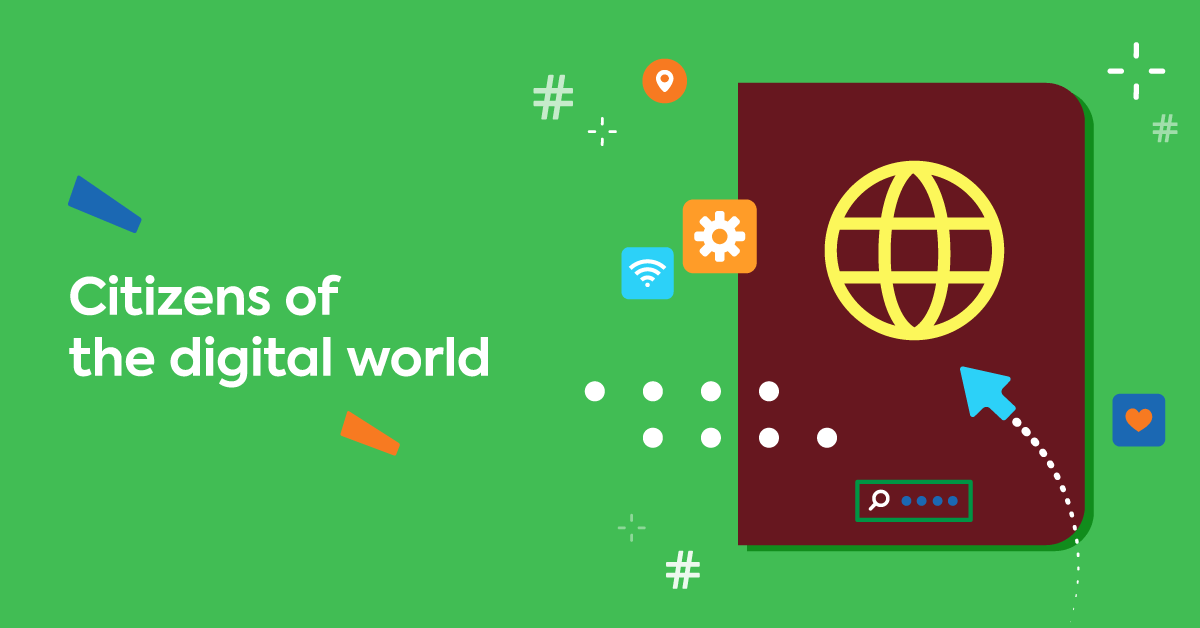If your employees use digital technology at work, chances are they’ll have an online presence. And by that, we mean any kind of information that can be found online and is attributed to them. Some of your employees (e.g., digital strategists, marketers, influencers, and active engagers with social media) will have carefully crafted their social media presence. But for most, their online presence will have evolved over time without any real forethought or planning.
There’s nothing wrong or unusual about this. But you can all benefit if employees improve their online presence. Developing a so-called “professional online presence” will help your employees better represent themselves and your company.
And it isn’t difficult. But most of your employees will require some training and structure to get it right. So, before you invest, let’s take a look at the business case for that kind of training.
Why do employees need a professional online presence?
Global stats show that around 4.88 billion people are internet users. And the majority of these (4.55 billion) actively use social networking platforms. But you probably don’t need these stats to know that most of your employees will already be familiar with social media. And fluent in online networking (particularly the millennials and Gen Z workers who make up the majority of the workforce).
So, why do you need to formally train them in how to build an online presence? Surely, they already have enough informal knowledge to do this themselves.
And besides, what benefits will helping them grow a professional online presence bring to the business? By encouraging them to network, and giving them the digital skills to do this more effectively, won’t you run the risk of losing them?
All fair questions. Which, if you’re making a pitch for training, your stakeholders will want answered. So, here’s the rationale:
1. Grow good digital citizens
With digital media comes responsibility or “digital citizenship”.
What is digital citizenship?
Well, digital citizenship in the workplace is about giving employees in your organization the understanding and skills to operate ethically in a digital world.
We should all think carefully about how we communicate online and the effect this might have on others. And encouraging your employees to conduct themselves with others in mind, and become good digital citizens, forms part of a wider duty of care package many employers are offering their teams.
2. Demonstrate standards
Employees who engage effectively and professionally online send out a powerful message about your business. They’re living proof that your organization values and invests in technology, that you’re forward-thinking and committed to developing high functioning cyber citizens.
It shows that you trust and value your employees and know that they’re confident and capable of representing your company in its best light. Because you don’t just teach them how to use online channels, but also how to use them in the best possible way so they’re inclusive and respectful.
3. Broaden your reach
By creating an online presence, your employees can network and meet customers and prospects wherever they are in the world. They can reach them in forums and communities where they spend their time and feel at home.
Having a professional online presence also makes it easier for your employees to form new connections and grow your own business network. It makes your business more discoverable, too.

4. Do your research
Having a strong professional online presence means your employees are better-placed to learn about trends, industry developments, and industry influencers. And find out about what other companies (your competitors) are up to.
A great form of research if you know where to look, it can help them learn about what customers want, their pain points, challenges, and wish lists.
5. Market your experts
If you’ve got employees who know their stuff, are good communicators, and confident in sharing their skills and knowledge, you’re in luck.
Help them grow their professional online presence so they can share their expertise with the wider world. Not only will their credibility and third-party recognition grow, yours will too.
6. Keep safe and secure
The more you help employees become informed and educated cyber citizens, the safer your business becomes. Data breaches and security threats are real risks to your business.
Giving employees the skills to build an online presence that’s safe and secure, reduces the risk of them disclosing sensitive information due to phishing or other cyber scams.
7. Show your face
Your people are your business. Investing in online presence management training for your employees means you can confidently share the human side of your organization.
8. Manage the personal vs. professional
How your employees interact digitally could reflect back on your organization. That’s not to say that how they use social media for personal reasons needs to be monitored or restricted. They are, of course, entitled to their privacy.
But how you, as an employer, can help them is by giving them the online presence management skills to separate their private and professional personas if they want to.
9. Improve not introduce
Digital media is all-consuming. And it’s here to stay.
Most—if not all—of your employees will already use social media and online networks on a regular basis. So, giving them the skills to do this more effectively is a simple and sensible way of recognizing this and making it work to your advantage.
10. Upskill your people
All training is good training. Offering employees training in online presence management demonstrates a commitment to their personal development and career progression—particularly if those skills aren’t directly tied to their job.
Yes, it could open up other career opportunities, but so will the acquisition of any new skills. And deciding to withhold training because you’re afraid your employees will become more… employable (and possibly leave) just isn’t an option.
Personal development is at the heart of every successful organization. Without it, your employees will feel undervalued, overlooked, and out of touch. And will they leave? Not possibly. Absolutely.
Foster a strong learning culture with TalentLMS
The training platform that users consistently rank #1.
Easy to set up, easy to use, easy to customize.
How to help employees improve their online presence
We’ve looked at the whys. And seen a compelling case for helping an employee’s professional online presence evolve. So, now let’s look at how you can achieve this.
Below are specific skills and topics to consider as part of your professional online presence training package. But remember, as the digital world evolves, your training needs to evolve, too.
Making a plan
Rather than applying an ad hoc approach to social media engagement and digital interactions, give your employees the skills to professionalize their online presence by planning their own personal social media strategy.
Encourage them to think about what they want to achieve through social media and how they can get there.
Recognizing opportunities
Using social media in the right way can build relationships, boost reputations, create influence, and enhance business and career prospects.
Help your employees know where to look and how to engage online so they can access, maximize, and benefit from the right opportunities.
Getting it right
Using social media in the wrong way has the potential to damage businesses, reputations, and brands in less than 280 characters. So, it’s vital your employees understand why they need to take social media seriously and what the risks are if they don’t.
Define appropriate and inappropriate content and behavior. Include tips and techniques around how to keep your content safe. Help employees to discern how and why they use technology. And help them understand intentional behaviors like being helpful to others and what might constitute cyberbullying.
Putting a face in the brand
These days, it’s not enough for employees to rest in the shade under the umbrella of a corporate brand. They need a personal brand, too, to help them shine. And, whatever that personal brand is, needs to reflect positively back on yours.
Empower employees to tell their story their way, by consciously defining their brand. Help them identify their values, expertise, and qualities. And show them how to project them onto others through their online presence, so they can stand out and succeed. Do this and your brand will stand out and succeed, too.
Learning about LinkedIn
The most popular platform for professional networking and job-hunting, more businesses and professionals are using LinkedIn to network, market, and stay ahead in their industries. By using LinkedIn, your employees can help build your company’s digital presence as well as their own.
Give them the skills to use LinkedIn to its full potential to connect with potential partners, clients, and customers. Your marketing and sales teams will thank you for it!
Keeping things separate
Some people choose not to distinguish between their personal social media presence and their professional online presence. But for most of us, learning how to keep the two distinct is a useful skill.
It’s certainly a benefit where businesses are concerned. Keeping them separate doesn’t have to be complicated. It could be as straightforward as applying privacy settings to personal social media accounts and then creating separate professional profiles instead. Either way, make sure your employees know the simple steps they can take to effectively manage both.
Meet TalentLibrary™
A growing collection of ready-made courses that cover the digital skills
your teams need for success at work
![]()

Minimize risk, maximize opportunities
Digital technology brings opportunities. Opportunities to connect and communicate—wherever and whenever. Opportunities to share information, content, and ideas. Opportunities for discovery, training, and education. And opportunities for business growth, profit, and career development.
But for every opportunity, there’s also risk. There’s the risk it could pose to a business’s brand or an employee’s reputation. The risk around protecting customer data. And, where cyberbullying, fraud, and inappropriate and offensive content are concerned, a risk to an individual’s physical safety and mental health.
Employers who take digital citizenship seriously have the power to reduce those risks. In fact, they’re the only ones who can really make a tangible difference. So, who wants a more ethical, safe, professional, and productive cyberspace experience? We’re in.



